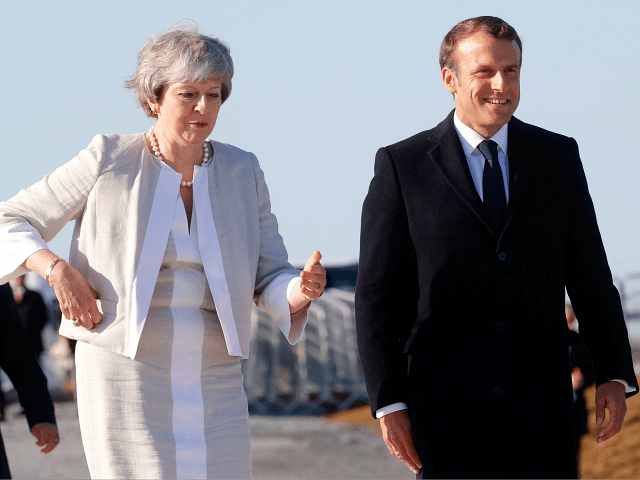French president Emmanuel Macron has indicated he does not care who succeeds Theresa May as Prime Minister of the United Kingdom, provided they are as “loyal and respectful” to the European Union as she has been.
“All the way through the negotiations she’s been incredibly loyal and respectful, she never stood in the way, we sometimes disagreed but she never took the discussions or Europe hostage,” President Macron said, in comments reported by The Times.
“I do not know who will come next, and I certainly do not want to interfere but I hope it will be the same sense of respect and seriousness that she had.”
The French leader’s description of Mrs May’s behaviour during the negotiations — particularly the comments referencing her having “never stood in the way” of the EU’s schemes as it sought to impose harsh terms on the United Kingdom, may anger Brexit supporters who have long suspected that the former Remain supporter never sought to use utilise the leverage available to secure better terms from the bloc.
Mrs May agreed to pay the EU a so-called “divorce bill” estimated at £39 billion — despite the United Kingdom putting billions more into the bloc’s central budget than it takes out every year — in exchange for Brussels merely agreeing to discuss future trade terms.
But rather than quickly agree to a free trade agreement and mutual recognition of standards — which would appear to be strongly in the EU’s economic interests, given it exports far, far more to the United Kingdom than the United Kingdom exports to the EU — once these commenced, Brussels instead insisted that the only way to maintain a so-called “frictionless” customs border along the land frontier between the British province of Northern Ireland and EU members-state the Republic of Ireland would be for the former to be effectively annexed to the EU Single Market and Customs Union.
This would of course mean creating customs barrier within the United Kingdom between Northern Ireland and mainland Great Britain, but Mrs May seemingly offered little pushback, attempting to resolve the issue by agreeing a withdrawal treaty with the EU which would incorporate the whole contry into a so-called “single customs territory” governed by an EU-interpreted “common rulebook” on competition, regulation, and state aid — EU membership minus Free Movement and representation in EU institutions in all but name.
Mrs May further agreed that these so-called “backstop” arrangements would come into force only after a lengthy and extendable “transition period” in which Britain would retain all the obligations of a full EU member-state, including allowing Free Movement immigration, with no EU representation — and that, once entered into, the British government would have no power to leave the backstop without the EU’s consent.
The EU, for its part, appeared to offer the United Kingdom no concessions whatsoever, even on relatively trivial issues like excluding the British from the Galileo satellite programme which they in large part funded and developed.
The EU has also already begun withdrawing EU institutions from Britain and excluding it from certain programmes, such as the carbon trading scheme — inflicting crippling costs on British Steel, for example.
All of this makes President Macron’s revelation that the Prime Minister apparently made no effort to drive a harder bargain with the EU by, for example, threatening to block its military integration programme, appear ill-advised at best.

COMMENTS
Please let us know if you're having issues with commenting.